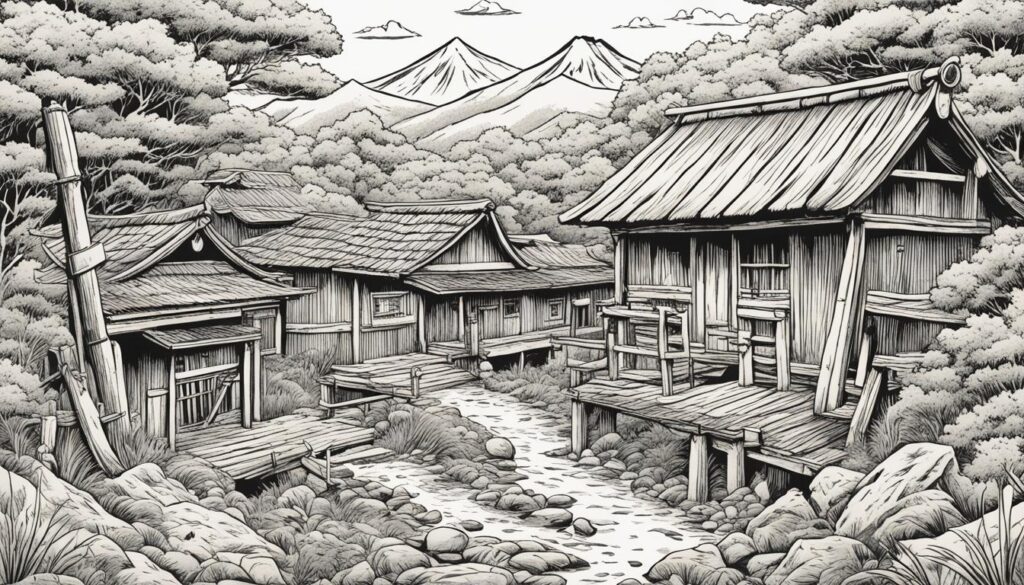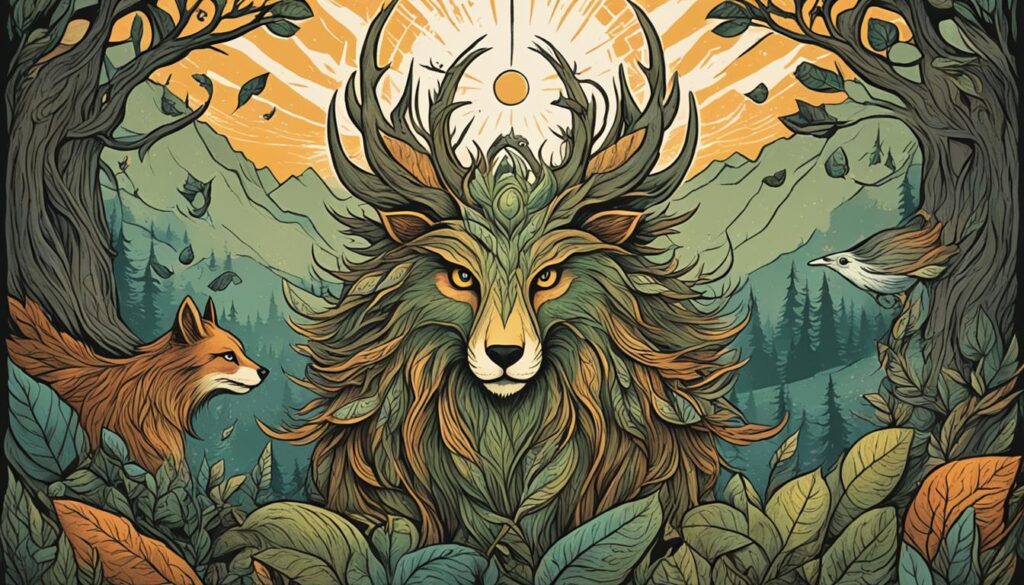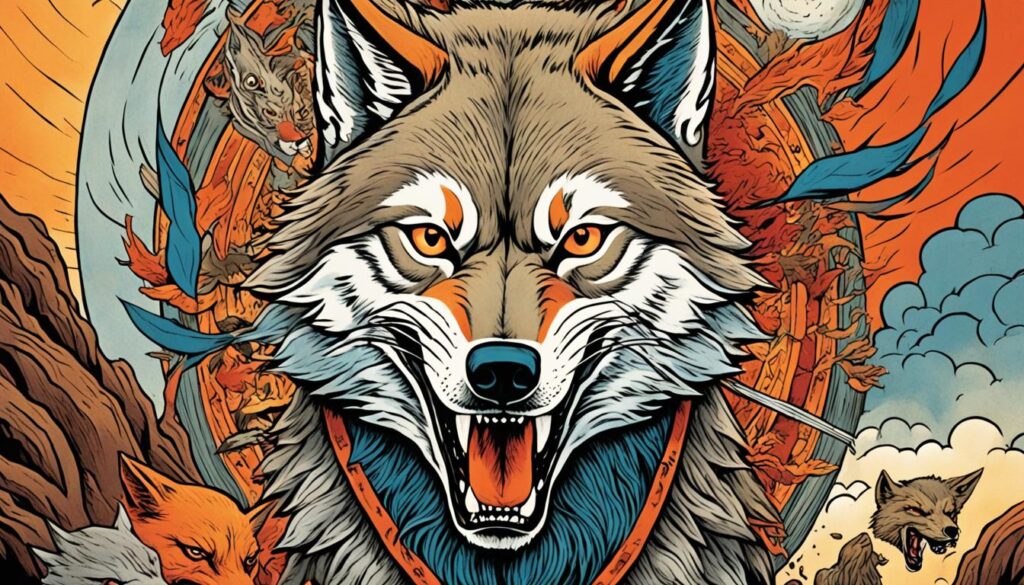Did you know that the traditional Ainu language, known as the Matagi language, is considered an endangered language in Japan? As efforts are being made to preserve the cultural heritage of the Ainu people and promote linguistic diversity, the importance of revitalizing the Matagi language has come to the forefront.
Indigenous languages like the Matagi language not only hold historical significance but also provide unique insights into the traditions, beliefs, and values of a particular community. Their preservation plays a vital role in maintaining cultural identity and fostering intergenerational connections.
In this article, we delve into the world of the Matagi people and their language, exploring the rich cultural traditions, hunting practices, and the linguistic connection between the Matagi and the Ainu people. Join us as we embark on a journey to understand the legacy and significance of the Matagi language and its impact on the preservation of Ainu culture.
The Matagi People and their Hunting Practices
The Matagi people are a community of skilled winter hunters who have been practicing the art of bear hunting for generations. Living in the mountainous regions of northern Japan, the Matagi have developed a deep connection to their natural surroundings and have honed their hunting techniques to perfection.
Hunting is not merely a pastime for the Matagi; it is an integral part of their way of life. They view bears and other animals they hunt as sacred gifts from the mountain gods, and their hunting practices are deeply rooted in their cultural beliefs and spirituality.
The Matagi people have developed specific techniques for tracking, ambushing, and capturing bears, passed down through generations. These techniques involve a combination of stealth, patience, and knowledge of the animal’s behavior and habitat. The Matagi hunters are highly skilled in navigating the treacherous terrains of the mountains, where bears are known to dwell.
But bear hunting is not just about the kill for the Matagi people. It is also about paying homage to the bears and showing respect for the cycle of life. They believe in the interconnectedness of all living beings and the importance of maintaining harmony with nature. This belief is reflected in their rituals and ceremonies surrounding bear hunting.
The Matagi culture, with its focus on bear worship and hunting traditions, shares many similarities with the ancient Ainu people of Japan. Both cultures revere bears as powerful spiritual beings, and both engage in rituals and practices that demonstrate their respect for these magnificent creatures.
Through their hunting practices, the Matagi people not only sustain themselves but also preserve their rich cultural heritage. They embody the wisdom of generations past and pass down their hunting traditions from one generation to the next.
“Our hunting practices are a way of expressing our gratitude to the mountain gods and ensuring the balance of nature. We approach every hunt with reverence and respect, recognizing the significance of our role as caretakers of the land.”
The Matagi people are true guardians of their environment, demonstrating a profound understanding of the delicate ecological balance that exists in the mountains. They have lived in harmony with nature for centuries, striving to maintain a sustainable way of life.
In the midst of the modern world, the Matagi people continue to preserve their cultural identity and pass down their hunting traditions. Their practices not only provide sustenance but also serve as a source of pride and a connection to their ancestral roots.
Decline of Matagi Culture
The decline of Matagi culture can be attributed to various factors, including the introduction of modern firearms and the availability of hunting licenses. These changes have led to significant shifts in Matagi hunting practices and have contributed to the cultural transformation of the Matagi people.
Prior to the introduction of modern firearms in the 19th century, bear hunting played a central role in Matagi culture. It was a collective endeavor that required the coordination and cooperation of the community. However, with the advent of modern firearms, individual hunting became easier, diminishing the need for group hunting activities. As a result, the traditional hunting practices of the Matagi changed, impacting the cultural fabric of their society.
Furthermore, the availability of hunting licenses also played a role in the decline of Matagi culture. These licenses allowed individuals to pursue hunting independently, weakening the communal hunting practices that were deeply embedded in the Matagi way of life.
“The introduction of modern firearms and hunting licenses has significantly impacted Matagi culture. The shift from collective bear hunting to individual hunting practices has resulted in a cultural change that has transformed the Matagi way of life.”
In addition to these sociocultural factors, environmental concerns and deforestation have emerged as significant challenges for the Matagi people. The preservation of natural habitats and the conservation of endangered species have sparked conflicts between the Matagi and environmental activists.
While the Matagi no longer hunt certain protected species like the Japanese serow, they continue to hunt bears under special licenses. This regulated hunting practice reflects a compromise between the preservation of cultural traditions and the need to address environmental concerns.
Overall, the decline of Matagi culture can be attributed to the impact of modern firearms, the availability of hunting licenses, and the emergence of environmental concerns. However, the Matagi people continue to navigate these challenges and strive to preserve their cultural heritage amidst a changing landscape.

Stay tuned for the next section where we explore the ethnic origin of the Matagi language and its connection to the Ainu language.
The Matagi Language and its Ethnic Origin
The Matagi language, spoken by the Matagi people of Japan, has strong linguistic connections to the Ainu language. It is believed that the Matagi are descendants of Ainu-speaking hunters and fishermen who migrated from Hokkaido to Honshu. As a result, the Matagi language contains a number of Ainu loanwords, indicating their ethnic origin and the historical ties between the Matagi and the Ainu people.
This linguistic influence is evident in the Matagi language’s vocabulary, particularly in terms related to geography, forests, and animals. Ainu-derived toponyms and loanwords are used by the Matagi to describe their natural surroundings and the unique wildlife they encounter during their hunts.
To better understand the linguistic connections between the Matagi and Ainu languages, researchers have conducted studies focusing on the shared lexicons and linguistic similarities. These studies have revealed the extent to which the Matagi language has inherited and incorporated elements of the Ainu language, shedding light on the cultural and linguistic exchange between these two indigenous groups.
Matagi Language and Ainu Loanwords
The influence of the Ainu language on the Matagi language can be seen in various loanwords that have been adopted over time. These loanwords not only reflect the cultural and historical ties between the Matagi and the Ainu people, but they also contribute to the linguistic diversity of Japan.
Here are some examples of Ainu loanwords commonly used in the Matagi language:
| Ainu Loanword | Meaning |
|---|---|
| シケカムイ (Shikekamui) | Mountain god |
| ユカラ (Yukara) | Epic poem |
| ウタリ (Utari) | Spirit possession |
| ホンダ (Honda) | Base or foundation |
These loanwords not only enrich the Matagi language but also serve as a testament to the cultural blending and linguistic connections between different indigenous groups within Japan.
Matagi Cultural Traditions and Spirituality
The Matagi people have a rich cultural heritage embedded with unique traditions and a deep sense of spirituality. Their customs and beliefs are deeply intertwined with their hunting practices and reverence for the natural world. The Matagi draw inspiration from their myths and legends to guide their way of life, fostering a harmonious balance between humans and nature.
Matagi Myths and Legends
In the heart of Matagi culture lies a collection of captivating myths and legends that provide insight into their origins and worldview. These stories are passed down through generations, showcasing the rich oral tradition of the Matagi people. They serve as a source of wisdom, moral guidance, and a connection to their ancestral roots. Through their myths, the Matagi cultivate a profound understanding of the natural world and their place within it.
“The ancient Matagi tale speaks of a brave hunter who ventured deep into the forests, guided by the mountain gods. His courage and respect for the land granted him the favor of these divine beings, bestowing upon him the knowledge and skill necessary for successful hunts. This myth illustrates the sacred bond between the Matagi and the mountain gods, emphasizing their deep spirituality.”
Rituals and Offerings
The Matagi have developed intricate rituals and practices associated with hunting and bear worship, paying homage to the mountain gods and showing gratitude for the bountiful gifts they receive. Before embarking on a hunt, the Matagi engage in specific chants and prayers, seeking blessings and protection from the divine. These rituals are believed to ensure a safe and successful hunt while honoring the sacredness of the animals they pursue.
Once a kill is made, the Matagi carefully perform butchering and treatment rituals, demonstrating their respect for the animal’s spirit and the cycle of life and death. Offerings are made to express gratitude for the sustenance provided and to maintain the delicate balance between the human world and the spiritual realm of the mountains.
The Role of Mountain Gods
Central to Matagi spirituality are the mountain gods, revered as guardians and protectors of their community. These deities are believed to dwell within the peaks and forests, possessing the power to ensure successful hunts and protect the Matagi from harm. The Matagi rely on their connection with the mountain gods, seeking their guidance and blessings before and during their hunting endeavors. This bond with the divine reinforces the Matagi’s belief in the interconnectedness of all living beings and their responsibility to preserve the natural environment.

Matagi Language and the Ainu Language
The Matagi language, a regional Japanese dialect, has linguistic connections to the Ainu language, the traditional language of the Ainu people. The Ainu are the indigenous people of Hokkaido, the northernmost island of Japan. Research on the Matagi language has revealed intriguing linguistic similarities and shared lexicons with the Ainu language, indicating a significant cultural exchange between the two communities.
This social, regional, and contact-induced dialect incorporates Ainu vocabulary, reflecting the historical and cultural interactions between the Matagi and Ainu people. The linguistic similarities provide valuable insights into the shared heritage and linguistic diversity of Japan.
Language research has been conducted to explore the lexicons and grammatical structures present in both the Matagi and Ainu languages. The goal is to better understand the linguistic relationship between the two and preserve the unique linguistic heritage of the Matagi people.
“The Matagi language shares some lexicons with the Ainu language, indicating a linguistic connection between the two.”
In their efforts to document and preserve the Matagi language, linguists and researchers have compiled dictionaries to capture the vocabulary, grammar, and phonetics of the Matagi dialect. The compilation of a Matagi dictionary serves as a crucial resource for future generations, facilitating the continued study and revitalization of this endangered language.
The linguistic study of the Matagi language and its connection to the Ainu language not only contributes to our understanding of Japan’s linguistic diversity but also highlights the importance of preserving endangered languages and the cultural heritage of indigenous communities.
Impact and Legacy of the Matagi People
The Matagi people, known for their hunting skills and deep connection to the mountains, have left a lasting impact on various aspects of Japanese culture. Their presence has influenced activities such as tenkara fishing, mountain recreation, and even literature and art.
Tenkara fishing is a traditional Japanese fly-fishing method that originated in the mountainous regions where the Matagi resided. As the Matagi migrated through different areas of Japan, they introduced and spread the practice of tenkara fishing. This simple yet effective fishing technique, using only a rod, line, and fly, has become a popular recreational activity for anglers in Japan and around the world.
The Matagi’s deep knowledge of the mountains and their way of life have also inspired the creation of various mountain recreation activities. One such activity is called “Genryu Tenkara,” which involves fishing in the fast-flowing streams and rivers found in mountainous areas. Another activity is “sawa-no-bori,” which translates to “stream climbing.” This exhilarating adventure sport involves navigating through the waterfalls and rocky terrains of mountain streams.
“The Matagi people’s close relationship with nature and their mountain expertise have provided the inspiration for these engaging recreational activities,” says Hiroshi Tanaka, a cultural anthropologist specializing in Japanese indigenous cultures.
Moreover, the Matagi’s unique traditional practices and myths have found their way into literature and art. References to the Matagi can be found in novels, manga, and comic books, capturing their cultural significance and the aura of mystery that surrounds them. These cultural spin-offs not only entertain but also serve as a means of preserving and honoring the Matagi traditions and their cultural heritage.
The impact and legacy of the Matagi people are profound, extending beyond their hunting skills and traditions. Their contributions to tenkara fishing, mountain recreation, and the arts have enriched Japanese culture and continue to captivate people with their fascinating stories and deep connection to the mountains.

Conclusion
The Matagi language, an endangered language deeply rooted in the cultural heritage of the Ainu people, plays a crucial role in preserving linguistic diversity in Japan. To ensure its preservation for future generations, diligent efforts are underway to document and revitalize the Matagi language.
The Matagi people’s hunting practices, cultural traditions, and spirituality have left an indelible mark on Japanese culture. Their rich heritage has influenced activities such as fishing and mountain recreation, shaping the way these activities are carried out in contemporary Japan.
The connection between the Matagi language and the Ainu language exemplifies the shared history and cultural exchange between various indigenous groups in Japan. It highlights the importance of recognizing and celebrating the diverse linguistic and cultural traditions that make up the fabric of Japanese society.
Preserving and revitalizing the Matagi language is not only crucial for the continuation of the Ainu cultural heritage but also for the larger goal of safeguarding linguistic diversity worldwide. By valuing and protecting endangered languages like Matagi, we can embrace the incredible wealth and beauty that linguistic diversity brings to our global community.
FAQ
What is the Matagi Language?
The Matagi language is a traditional Ainu language spoken by the Matagi people, who are traditional winter hunters in the Tohoku region of northern Japan. It is a regional Japanese dialect with some Ainu vocabulary.
Why is the Matagi Language considered endangered?
The Matagi language is considered endangered because its usage is declining, and there is a risk of it becoming extinct. Efforts are being made to document and revitalize the language to preserve the cultural heritage of the Ainu people and linguistic diversity in Japan.
What are the efforts being made to preserve the Matagi Language?
There are ongoing efforts to document and revitalize the Matagi language. Research is being conducted to compile a Matagi dictionary and study the common lexicons with the Ainu language. These efforts aim to ensure the preservation of the language for future generations.
Why are indigenous languages like the Matagi Language important to preserve?
Indigenous languages, like the Matagi Language, are important to preserve because they hold valuable cultural and historical knowledge. They also contribute to linguistic diversity, enriching the overall tapestry of human languages and promoting cultural heritage preservation.
How do the Matagi people maintain their hunting traditions and spirituality?
The Matagi people maintain their hunting traditions and spirituality through specific techniques and rituals. They have offerings and prayers to the mountain gods, chanting before, during, and after hunts, and adhere to proper butchering and treatment of the animals they kill. These practices enable them to maintain their connection to their cultural heritage and beliefs.
What is the linguistic connection between the Matagi and the Ainu people?
The Matagi language contains Ainu vocabulary, indicating a linguistic connection between the Matagi and the Ainu people. The Matagi are believed to be the historical descendants of Ainu-speaking hunters and fishermen who migrated from Hokkaido to Honshu. The language reflects this shared history and cultural exchange between the two groups.
How have the Matagi people influenced Japanese culture?
The Matagi people have had a significant impact on various aspects of Japanese culture. They contributed to the development of tenkara fishing, a traditional Japanese fly-fishing method, and influenced mountain recreation activities like “Genryu Tenkara” and “sawa-no-bori.” They are also featured in literature and art, leaving a lasting legacy and cultural imprint.
Why is language revitalization important for the Matagi people?
Language revitalization is important for the Matagi people to ensure the preservation of their cultural heritage and identity. It allows them to pass down traditional knowledge, customs, and values to future generations, maintaining a connection to their roots and promoting a sense of pride in their linguistic heritage.
